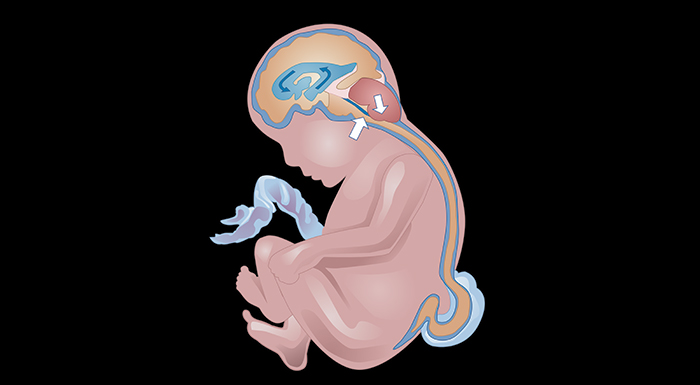Children who underwent prenatal surgery to repair a common birth defect are more likely to walk independently, have fewer follow-up surgeries, and have better fine motor and self-care skills by ages 6 to 10 compared to children who underwent the procedure after birth, a study finds.
The surgery corrects a serious form of spina bifida called myelomeningocele, a birth defect in which the spinal cord juts through an opening in the spine. Without the corrective surgery, the defect could cause a condition called hindbrain herniation, where the protruding cord blocks the flow of spinal fluid and pulls the brain into the base of the skull. The corrective surgery is traditionally done after birth but fetal surgery is increasingly becoming a common choice among patients and physicians.
The study was published in Pediatrics and funded by the National Institutes of Health’s Eunice Kennedy Shriver National Institute of Child Health and Human Development (NICHD). The Biostatistics Center based at the Milken Institute School of Public Health (Milken Institute SPH) led this study and served as the coordinating center. In this role, the Biostatistics Center managed numerous aspects of the study, including working with the researchers on the study design, writing the protocol, developing the operation manuals; designing and implementing the data collection systems; and analyzing data for the study.
“This study has confirmed the differences that we saw between the groups in the original trial,” said Elizabeth Thom, PhD, principal investigator of the study and a research professor of biostatistics and bioinformatics at Milken Institute SPH. “It also provides information about longer term outcomes for women and their doctors when considering prenatal surgery, which does have some risks for both mothers and babies.”
The study is a follow-up to a randomized trial conducted by the researchers in 2011. In that study, researchers found children who underwent fetal surgery to correct myelomeningocele required fewer surgical procedures to divert, or shunt, fluid away from the brain by their first birthday, compared to children who had the surgery after birth. They also found that at 30 months of age, the children who underwent fetal surgery were more likely to walk without crutches or other devices.
To conduct the follow-up research, scientists evaluated 161 children from the original study, now ages 6 to 10. They found the children who underwent prenatal surgery walked more independently than their peers, and their families reported fewer follow-up surgeries and a better quality of life than children who had postnatal surgery. The results indicate prenatal surgery to correct myelomeningocele may have some benefits throughout a child’s life compared with surgery conducted after birth. However, the two groups did not differ significantly in a test that measured communication abilities, daily living skills, and social interaction skills.
The study, “prenatal repair of myelomeningocele and school-age functional outcomes,” was published Jan. 24 in Pediatrics. Learn more about The Biostatistics Center here.


